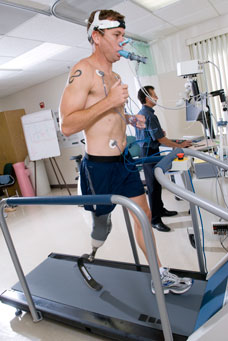Study could determine if artificial feet give amputee runners advantage
Researchers in the USF School of Physical Therapy and Rehabilitation Sciences are conducting a pilot study that will examine whether amputees with specialized prosthetic feet might have an advantage over non-amputee runners.
This issue was brought to the forefront during the 2008 summer Olympics in Beijing when the International Association of Athletics Federations questioned whether runner Oscar Pistorius would have a decided advantage over other runners because of his prosthetic running feet.

Dr. Larry Mengelkoch (left) and Dr. Jason Highsmith (right) collect data from an amputee runner participating in the pilot study.
And this is one of many questions USF researchers are trying to answer as part of a pilot study funded by the USF/COM Signature Interdisciplinary Program in Cardiovascular Research, starting last summer. The researchers, now about half way through the two-year study, have been following six amputee athletes, conducting their research and early data collection primarily at the Human Functional Performance Laboratory at the USF School of Physical Therapy and Rehabilitation Sciences.


For the study, researchers use the Human Functional Performance Laboratory in the USF School of Physical Therapy and Rehabilitation Sciences.
Heading the study are Larry Mengelkoch, PT, PhD, and Jason Highsmith, PT, DPT, both from the USF School of Physical Therapy and Rehabilitation Sciences, and Jason Kahle, CPO, LPO, a prosthetist based in Tampa.
Dr. Highsmith and Kahle are primarily interested in understanding when a person with lower limb amputation includes recreational jogging and the occasional road-race, such as a 5K, a 10K race or sprint triathlon, really needs to have a specialized running prosthesis.
“These devices are much more expensive than traditional walking and all-purpose prostheses and insurance companies typically do not pay for them, so they are not readily fabricated and furnished for patients,” said Dr. Highsmith, assistant professor in the School of Physical Therapy and Rehabilitation Sciences.
“If we knew more about the top speed capabilities of traditional walking and all purpose feet, we could more objectively recommend prostheses to maximize function and satisfaction to suit the individual’s lifestyle.”
Dr. Mengelkoch is examining the metabolic cost and gait efficiency of the different foot options.
“A recent study suggested that highly fit people with transtibial amputations using a run-specific (ESR) foot, were able to obtain similar peak running speeds at a similar energy cost, compared to highly fit non-amputee runners,” said Dr. Mengelkock, associate professor in the School of Physical Therapy and Rehabilitation Sciences.
“This study suggested that run-specific ESR feet may put the transtibial amputee, on a nearly equal playing field, but not at an advantage, for running.”
The USF study aims to clarify the performance differences of these feet at walking and running speeds in people with different levels of amputation and compare amputee performance to non-amputees.
“This study should provide further insight into whether or not different prosthetic feet should be used and/or prescribed for optimal performance for different functional activities, and whether or not ESR feet equalize or improve running performance for persons with lower limb amputation, compared to non-amputee runners,” Dr. Mengelkoch said.
The researchers plan to continue this work by way of applying for grant funding through the Department of Defense (DOD). The DOD supports research that aims to advance optimal treatment and rehabilitation from musculoskeletal injuries sustained during combat or combat-related activities. The research team plans to examine which feet maximize physical performance during common and complex military ambulatory tasks that soldiers encounter. Such study would enable the military to prescribe the most appropriate prosthetic components that might allow soldiers to return to their military occupational specialty.
For further information about the running study or other related projects in the Human Functional Performance Laboratory, contact Dr. Highsmith at mhighsmi@health.usf.edu or Dr. Mengelkoch at lmengelk@health.usf.edu.

